Hugh Masekela is a world-renowned flugelhornist, trumpeter, bandleader, composer, singer and defiant political voice who remains deeply connected at home, while his international career sparkles. He was born in the town of Witbank, South Africa in 1939. At the age of 14, the deeply respected advocator of equal rights in South Africa, Father Trevor Huddleston, provided Masekela with a trumpet and, soon after, the Huddleston Jazz Band was formed. Masekela began to hone his, now signature, Afro-Jazz sound in the late 1950s during a period of intense creative collaboration, most notably performing in the 1959 musical King Kong, written by Todd Matshikiza, and, soon thereafter, as a member of the now legendary South African group, the Jazz Epistles (featuring the classic line up of Kippie Moeketsi, Abdullah Ibrahim and Jonas Gwangwa).
In 1960, at the age of 21 he left South Africa to begin what would be 30 years in exile from the land of his birth. On arrival in New York he enrolled at the Manhattan School of Music. This coincided with a golden era of jazz music and the young Masekela immersed himself in the New York jazz scene where nightly he watched greats like Miles Davis, John Coltrane, Thelonious Monk, Charlie Mingus and Max Roach. Under the tutelage of Dizzy Gillespie and Louis Armstrong, Hugh was encouraged to develop his own unique style, feeding off African rather than American influences – his debut album, released in 1963, was entitled Trumpet Africaine.
In the late 1960s Hugh moved to Los Angeles in the heat of the ‘Summer of Love’, where he was befriended by hippie icons like David Crosby, Peter Fonda and Dennis Hopper. In 1967 Hugh performed at the Monterey Pop Festival alongside Janis Joplin, Otis Redding, Ravi Shankar, The Who and Jimi Hendrix. In 1968, his instrumental single ‘Grazin’ in the Grass’ went to Number One on the American pop charts and was a worldwide smash, elevating Hugh onto the international stage.
His subsequent solo career has spanned 5 decades, during which time he has released over 40 albums (and been featured on countless more) and has worked with such diverse artists as Harry Belafonte, Dizzy Gillespie, The Byrds, Fela Kuti, Marvin Gaye, Herb Alpert, Paul Simon, Stevie Wonder and the late Miriam Makeba.
In 1990 Hugh returned home, following the unbanning of the ANC and the release of Nelson Mandela—-an event anticipated in Hugh’s anti-apartheid anthem ‘Bring Home Nelson Mandela’ (1986) which had been a rallying cry around the world.
Source: http://www.hughmasekela.co.za/; Pictures by kymsnetfeatures.

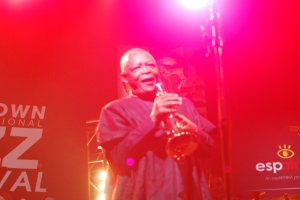
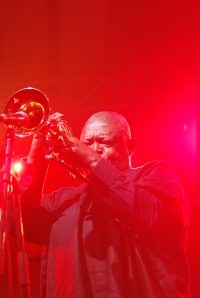
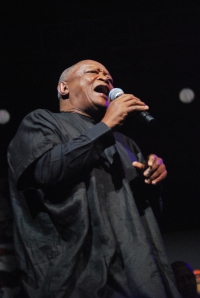
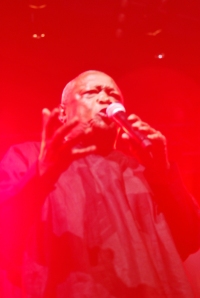
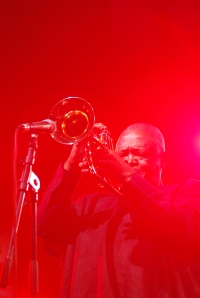
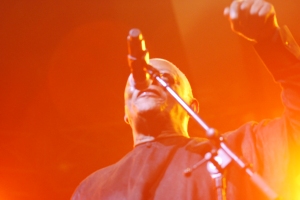
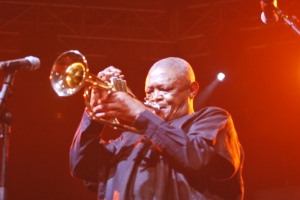
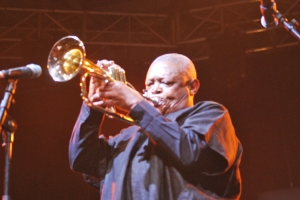
Salaamu Kimani – FYI – Hope we can show this in Nairobi [?] some time…
Blue Notes and Exiled Voices
Dir: Imruh Bakari, 1991, 52mins, UK
Ceddo Film & Video/Arts Council for Channel Four
Award: AGIP AWARD – Cinema Africano, Milan, 1992 – Best Short Film [Documentary]
The film looks at the generation of black South Africans who chose exile as an escape from apartheid in their home country and who used the art of music as an instrument of resistance and solidarity. Featured artists include: Hugh Masekela, Louis Moholo, Pinise Saul, Brotherhood of Breath, and Mervyn Africa. Archive footage recalls the London premiere of the musical `King Kong’ in 1961; and Miriam Makeba’s appeal against apartheid at the United Nations in 1964. The film sheds light on the pervasive tragic effects of apartheid, and concludes with images of the 1990 release from prison of Nelson Mandela after twenty-seven years.
Great to hear from you brother. It would be lovely to screen it here. Let me put some thought to this and revert. Kind regards.